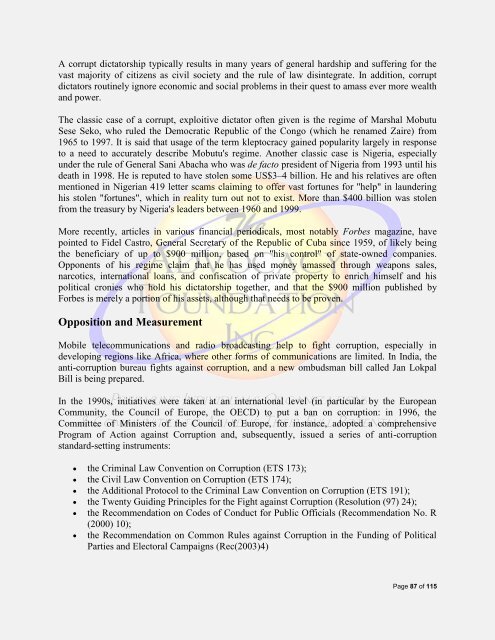Judicial ReEngineering
Judicial ReEngineering
Judicial ReEngineering
Create successful ePaper yourself
Turn your PDF publications into a flip-book with our unique Google optimized e-Paper software.
A corrupt dictatorship typically results in many years of general hardship and suffering for the<br />
vast majority of citizens as civil society and the rule of law disintegrate. In addition, corrupt<br />
dictators routinely ignore economic and social problems in their quest to amass ever more wealth<br />
and power.<br />
The classic case of a corrupt, exploitive dictator often given is the regime of Marshal Mobutu<br />
Sese Seko, who ruled the Democratic Republic of the Congo (which he renamed Zaire) from<br />
1965 to 1997. It is said that usage of the term kleptocracy gained popularity largely in response<br />
to a need to accurately describe Mobutu's regime. Another classic case is Nigeria, especially<br />
under the rule of General Sani Abacha who was de facto president of Nigeria from 1993 until his<br />
death in 1998. He is reputed to have stolen some US$3–4 billion. He and his relatives are often<br />
mentioned in Nigerian 419 letter scams claiming to offer vast fortunes for "help" in laundering<br />
his stolen "fortunes", which in reality turn out not to exist. More than $400 billion was stolen<br />
from the treasury by Nigeria's leaders between 1960 and 1999.<br />
More recently, articles in various financial periodicals, most notably Forbes magazine, have<br />
pointed to Fidel Castro, General Secretary of the Republic of Cuba since 1959, of likely being<br />
the beneficiary of up to $900 million, based on "his control" of state-owned companies.<br />
Opponents of his regime claim that he has used money amassed through weapons sales,<br />
narcotics, international loans, and confiscation of private property to enrich himself and his<br />
political cronies who hold his dictatorship together, and that the $900 million published by<br />
Forbes is merely a portion of his assets, although that needs to be proven.<br />
Opposition and Measurement<br />
Mobile telecommunications and radio broadcasting help to fight corruption, especially in<br />
developing regions like Africa, where other forms of communications are limited. In India, the<br />
anti-corruption bureau fights against corruption, and a new ombudsman bill called Jan Lokpal<br />
Bill is being prepared.<br />
In the 1990s, initiatives were taken at an international level (in particular by the European<br />
Community, the Council of Europe, the OECD) to put a ban on corruption: in 1996, the<br />
Committee of Ministers of the Council of Europe, for instance, adopted a comprehensive<br />
Program of Action against Corruption and, subsequently, issued a series of anti-corruption<br />
standard-setting instruments:<br />
the Criminal Law Convention on Corruption (ETS 173);<br />
the Civil Law Convention on Corruption (ETS 174);<br />
the Additional Protocol to the Criminal Law Convention on Corruption (ETS 191);<br />
the Twenty Guiding Principles for the Fight against Corruption (Resolution (97) 24);<br />
the Recommendation on Codes of Conduct for Public Officials (Recommendation No. R<br />
(2000) 10);<br />
the Recommendation on Common Rules against Corruption in the Funding of Political<br />
Parties and Electoral Campaigns (Rec(2003)4)<br />
Page 87 of 115

















